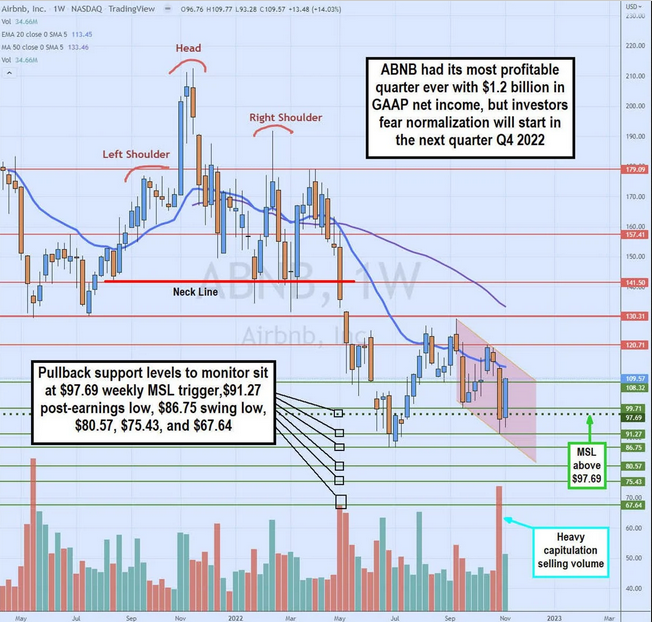Use the Airbnb Stock Implosion to Your Advantage
2022.11.17 19:42
[ad_1]
- Airbnb had its most profitable quarter in history with a GAAP net income of $1.2 billion, up 45% YoY
- Investors may be overly paranoid from the company stating that Q4 bookings “would moderate slightly from Q3”
- While trading at 42X seems expensive, it’s only valued at 20X free cash flow
- Airbnb’s asset-light model gains more supply from new hosts in weaker economic times as homeowners are even more motivated to earning extra side income
Digital lodging platform Airbnb Inc (NASDAQ:) shares took a plunge on its Q3 2022 release as the forward guidance was tepid. The company was “born” in 2007 as a digital booking and home rental platform connecting hosts with guests to rent out their property for days to weeks.
It’s an asset-light business model very much like Uber (NYSE: NYSE:), Door (NYSE: DASH), and Lyft (NASDAQ: NASDAQ:) where Airbnb plays the role of the middleman connecting both sides and taking a commission on the transaction.
Unlike Uber and LYFT, Airbnb is actually profitable on a GAAP basis. It joins the ranks of other travel hosting services, including Booking.com (NASDAQ: NASDAQ:), Expedia (NYSE: NASDAQ:), and TripAdvisor (NASDAQ: NASDAQ:). Airbnb has made a stunning recovery into the black and in GAAP form since 2021.
The company felt the sting of a strong but still remained firmly profitable. However, the US dollar impacts are expected to continue to be a headwind in the near future, with impacts to its ADR starting in Q4. So far, the effects of higher inflation and waning consumer discretionary spending haven’t impacted earnings.
Recessions Bolster New Host Growth
was born during the 2007 housing bubble. The company noted how its New Hosts on Airbnb grew rapidly, just as in the 2008 recession, as homeowners became more eager for additional income. It’s important to note that its hosting supply rises during weaker economic times mean more inventory at virtually no cost to the company. Airbnb is rolling out an “all-new, super easy way for millions of people to Airbnb their homes” in a 2022 Winter Release.
A Look at the Numbers
On Nov. 1, 2022, Airbnb released its fiscal third-quarter 2022 results for the quarter ending Sept 2022. The company reported a GAAP earnings-per-share (EPS) profit of $1.79, excluding non-recurring items, versus consensus analyst estimates of $1.50, beating estimates by $0.29. Net income of $1.2 billion was improved by 31% YoY with a 42% margin, up from 37%. Revenues rose 28.9% year-over-year (YOY) to $2.88 billion, beating analyst estimates for $2.85 billion. Nights and Experiences booked rose 25% YoY to 100 million. Gross booking value (GBV) rose to $15.6 billion, up 31% YoY. Adjusted EBITDA grew 32% YoY, $1.5 billion.
A Sign of Normalization to Come?
Airbnb noted that one month into its current Q4 2022, the company has seen cancellations stabilize, renewed interest in urban stays, and a strong backlog of future bookings. They provided Q4 2022 revenue guidance between $1.80 to $1.88 billion versus $1.86 billion consensus analyst estimates. Nights and Experiences booked growth to “moderate slightly” relative to Q3. This is the part that spooked investors and caused shares to collapse post-market.
Are Investors Paranoid?
Although this was a record quarter, investors fear the good times may already be turning. The slight slowdown in bookings using the phrase “moderate slightly from Q3” spooked investors, that took it as a sign that the next quarter might be the tipping point for normalization to trigger. However, Airbnb claims it’s up against tough year-over-year comparisons for Q4 and hasn’t noticed a material change in consumer spending as demand remains strong.
They also stated that new tailwinds such as long-term stays and non-urban travel are “here to stay” stemming from the flexibility of remote work and the elastic office. Most importantly, they saw the recovery of both urban and cross-border travel, which comprised the majority of its business pre-pandemic. Guests continue to stay longer (28 days or more), making up 20% of the total gross nights booked. Are investors overreacting to the possibility of normalization? As long as shares stay above the $100 level, the market believes so.

Here’s What the Chart Says About ABNB Stock
The weekly downtrend on ABNB triggered the neckline breakdown of the head-and-shoulders (HS) pattern through $141.50 in May 2022. This caused the weekly 20-period exponential moving average (EMA) to fall, creating a widening channel away from the weekly 50-period MA, which is now at $113.45 and $133.46, respectively.
Both MAs are upside resistances that are still falling. ABNB shares collapsed on earnings to hit a low of $91.27 on hefty selling volume indicating potential capitulation. Shares rallied the following week, propelled by the weekly market structure low (MSL) buy trigger on the breakout through $97.69.
The upside-falling channel resistance sits above the weekly 20-period MA, around $116.35. Key pullback supports levels to watch sit at the $97.69 weekly MSL trigger, $91.27 post-earnings low, $86.75 swing low, $80.57, $75.43, and $67.64 wish list price level.
Original Post
[ad_2]
Source link








